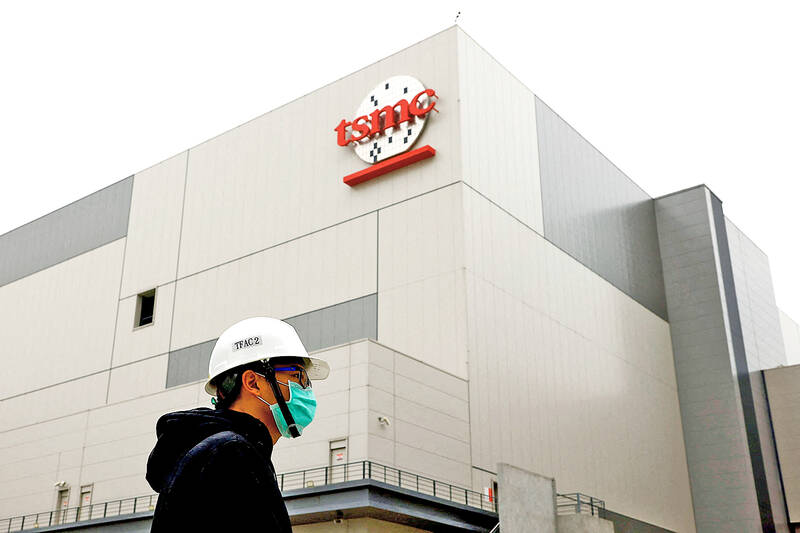Taiwan Semiconductor Manufacturing Co (TSMC, 台積電), the world’s largest contract maker of advanced chips, yesterday said it is a law-abiding company, and is committed to complying with all applicable laws and regulations including export controls.
The Hsinchu-based chip giant issued the statement after US news Web site The Information ran a story saying that the US Department of Commerce has launched a probe into TSMC over whether it breached export rules by making smartphone or artificial intelligence (AI) chips for China’s Huawei Technologies Co (華為).
“We maintain a robust and comprehensive export system for monitoring and ensuring compliance,” the statement said.

Photo: Ann Wang, Reuters
“If we have any reason to believe there are potential issues, we will take prompt action to ensure compliance, including conducting investigations and proactively communicating with relevant parties including customers and regulatory authorities as necessary,” it added.
US regulators had contacted TSMC to enquire over any production for Huawei, The Information said.
Huawei was blacklisted by the US in 2020 over national security concerns, barring it from securing chips made using US equipment. The restrictions also prevent Huawei from making its own chips using US technology without approval from the commerce department.
Huawei has said that all its advanced chips are sourced from Semiconductor Manufacturing International Corp (SMIC, 中芯國際), China’s biggest chipmaker.
The Chinese technology brand last year launched a smartphone with an advanced 7-nanometer chip made by SMIC, with the processor lauded by many in the industry as a major breakthrough for Chinese firms.
Beyond Huawei, the US had over the past two years introduced curbs banning Chinese companies from accessing the most advanced AI chips and technology. Firms such as Nvidia Corp and Advanced Micro Devices Inc, which make the most cutting-edge AI chips, cannot sell them to the Chinese market.
TSMC, the sole chip supplier of Apple Inc’s iPhone series, is also a key supplier of advanced chips used in AI applications.
TSMC chairman and chief executive C.C. Wei (魏哲家) told an earnings conference call on Thursday that AI demand is real and almost all major AI players are the company’s customers.
That explained why TSMC posted a record net income of NT$325.26 billion (US$10.14 billion) for the third quarter and forecast a sequential 13 percent increase in revenue for the fourth quarter.
Wei described the AI boom as just the beginning of a long-term trend that would enable TSMC to post healthy business growth over the next five years.
TSMC shares yesterday rose 4.83 percent to close at a new high of NT$1,085, Taiwan Stock Exchange’s data showed.

NEW IDENTITY: Known for its software, India has expanded into hardware, with its semiconductor industry growing from US$38bn in 2023 to US$45bn to US$50bn India on Saturday inaugurated its first semiconductor assembly and test facility, a milestone in the government’s push to reduce dependence on foreign chipmakers and stake a claim in a sector dominated by China. Indian Prime Minister Narendra Modi opened US firm Micron Technology Inc’s semiconductor assembly, test and packaging unit in his home state of Gujarat, hailing the “dawn of a new era” for India’s technology ambitions. “When young Indians look back in the future, they will see this decade as the turning point in our tech future,” Modi told the event, which was broadcast on his YouTube channel. The plant would convert

‘SEISMIC SHIFT’: The researcher forecast there would be about 1.1 billion mobile shipments this year, down from 1.26 billion the prior year and erasing years of gains The global smartphone market is expected to contract 12.9 percent this year due to the unprecedented memorychip shortage, marking “a crisis like no other,” researcher International Data Corp (IDC) said. The new forecast, a dramatic revision down from earlier estimates, gives the latest accounting of the ongoing memory crunch that is affecting every corner of the electronics industry. The demand for advanced memory to power artificial intelligence (AI) tasks has drained global supply until well into next year and jeopardizes the business model of many smartphone makers. IDC forecast about 1.1 billion mobile shipments this year, down from 1.26 billion the prior

People stand in a Pokemon store in Tokyo on Thursday. One of the world highest-grossing franchises is celebrated its 30th anniversary yesterday.

Zimbabwe’s ban on raw lithium exports is forcing Chinese miners to rethink their strategy, speeding up plans to process the metal locally instead of shipping it to China’s vast rechargeable battery industry. The country is Africa’s largest lithium producer and has one of the world’s largest reserves, according to the US Geological Survey (USGS). Zimbabwe already banned the export of lithium ore in 2022 and last year announced it would halt exports of lithium concentrates from January next year. However, on Wednesday it imposed the ban with immediate effect, leaving unclear what the lithium mining sector would do in the